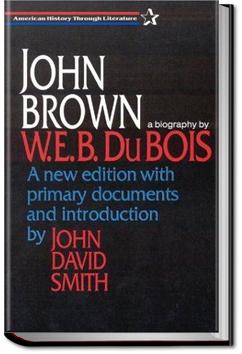UNLIMITED Audiobooks and eBooks
Over 40,000 books & works on all major devices
Get ALL YOU CAN for FREE for 30 days!
John Brown
W. E. B. Du Bois
Book Overview:
It tells the story of John Brown, from his Christian rural upbringing, to his failed business ventures and finally his "blood feud" with the institution of slavery as a whole. Its moral symbolizes the significance and impact of a white abolitionist at the time, a sign of threat for white slave owners and those who believed that only blacks were behind the idea of freeing slaves. Du Bois describes Brown as a biblical character: fanatically devoted to his abolitionist cause but also a man of rigid social and moral rules. Du Bois showcases his studies on socialism and social Darwinism as well in this work, a continuation on his examination of the genealogy of blacks outlined in The Philadelphia Negro (1899) and The Souls of Black Folk (1903) that refutes the biological differences between blacks and whites. As Du Bois draws out this biographical representation of John Brown, Brown was a man who based his reasoning for fighting against slavery not on social Darwinism, but on his personal morals. -
It tells the story of John Brown, from his Christian rural upbringing, to his failed business ventures and finally his "blood feud" with the institution of slavery as a whole. Its moral symbolizes the significance and impact of a white abolitionist at the time, a sign of threat for white slave owners and those who believed that only blacks were behind the idea of freeing slaves. Du Bois describes Brown as a biblical character: fanatically devoted to his abolitionist cause but also a man of rigid social and moral rules. Du Bois showcases his studies on socialism and social Darwinism as well in this work, a continuation on his examination of the genealogy of blacks outlined in The Philadelphia Negro (1899) and The Souls of Black Folk (1903) that refutes the biological differences between blacks and whites. As Du Bois draws out this biographical representation of John Brown, Brown was a man who based his reasoning for fighting against slavery not on social Darwinism, but on his personal morals. -
How does All You Can Books work?
All You Can Books gives you UNLIMITED access to over 40,000 Audiobooks, eBooks, and Foreign Language courses. Download as many audiobooks, ebooks, language audio courses, and language e-workbooks as you want during the FREE trial and it's all yours to keep even if you cancel during the FREE trial. The service works on any major device including computers, smartphones, music players, e-readers, and tablets. You can try the service for FREE for 30 days then it's just $19.99 per month after that. So for the price everyone else charges for just 1 book, we offer you UNLIMITED audio books, e-books and language courses to download and enjoy as you please. No restrictions.
Try now for FREE!

"Love your service - thanks so much for what you do!"
- Customer Cathryn Mazer
"I did not realize that you would have so many audio books I would enjoy"
- Customer Sharon Morrison
"For all my fellow Audio Book & E-Book regulars:
This is about as close to nirvana as I have found!"
- Twitter post from @bobbyekat



Community Reviews
"John Brown taught us that the cheapest price to pay for liberty is what it costs today" (p. 237).
John Brown's method of principled violence against entrenched systems of violent injustice must be taken seriously in dialogue with the non-violent methods of the Quakers, Gandhi and King. Du Bois bring
Fanatics? Hero? Terrorist? Martyr? Criminal mystic? John Brown, for sure, has never left anybody indifferent. Even W.E.B. Du Bois, in fact, dedicated him this biography! But what about it?
Well, it's a very strong portrait. It hints towards the lyricism, and it offers, unabashedly, the view of a man
John Brown might be the most based man in the history of the United States.
"The cost of liberty is less than the price of repression."
This was the refrain that Du Bois repeated, particularly in the last chapter of this surprising biography. I listened to it, and upon finishing, immediately had the urge to read much of it over again at once, in print, especially the beaut
This title is among my favorite biographies of all time.
The profs teaching the class I took in college featured John Brown as a small figure in American contemporary history and dismissed him fairly quickly. He meant well, but was not stable, they said; in the end, he took extreme, hopeless measure
This early work by W.E.B. Du Bois shows the author transitioning from an academic historian to a political writer. Ostensibly a biography, this is more revolutionary propaganda than historical document. However one chooses to categorize it, it is a worthwhile and entertaining work.
Du Bois is not he
Today happens to be the 158th anniversary of John Brown's ill-fated raid on Harper's Ferry. I was there just a month ago, and took that as a motive to read this bio by Du Bois. Du Bois is an excellent, literary writer, and it was a great book. It was published in 1909, commemorating the 50th anniver
This is the definitive work on Brown. If you had to read only one book on the subject, this would be it.
Du Bois manages to do what no other biographer has done, and I've read about a dozen books on Brown. Du Buois manages to place the man in context. After all, there are a whole lot of John Browns o
My only knowledge of John Brown prior to reading several books on him in the last year was that he had been a overzealous and unrealistic idealist that led a raid on Harper's Ferry to try to spark a slave rebellion. Reading more details about his planning and overall plan show the historical inaccur